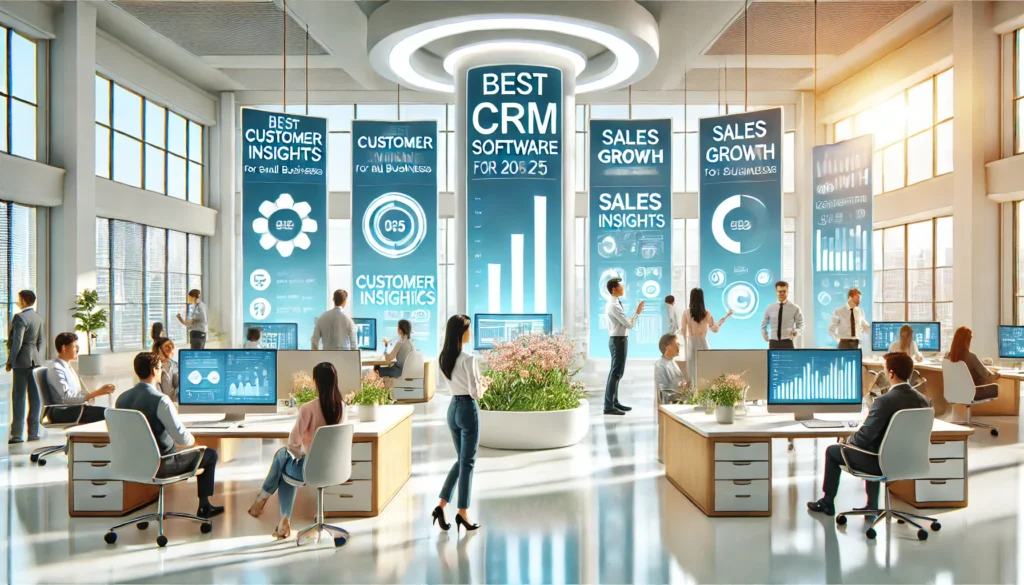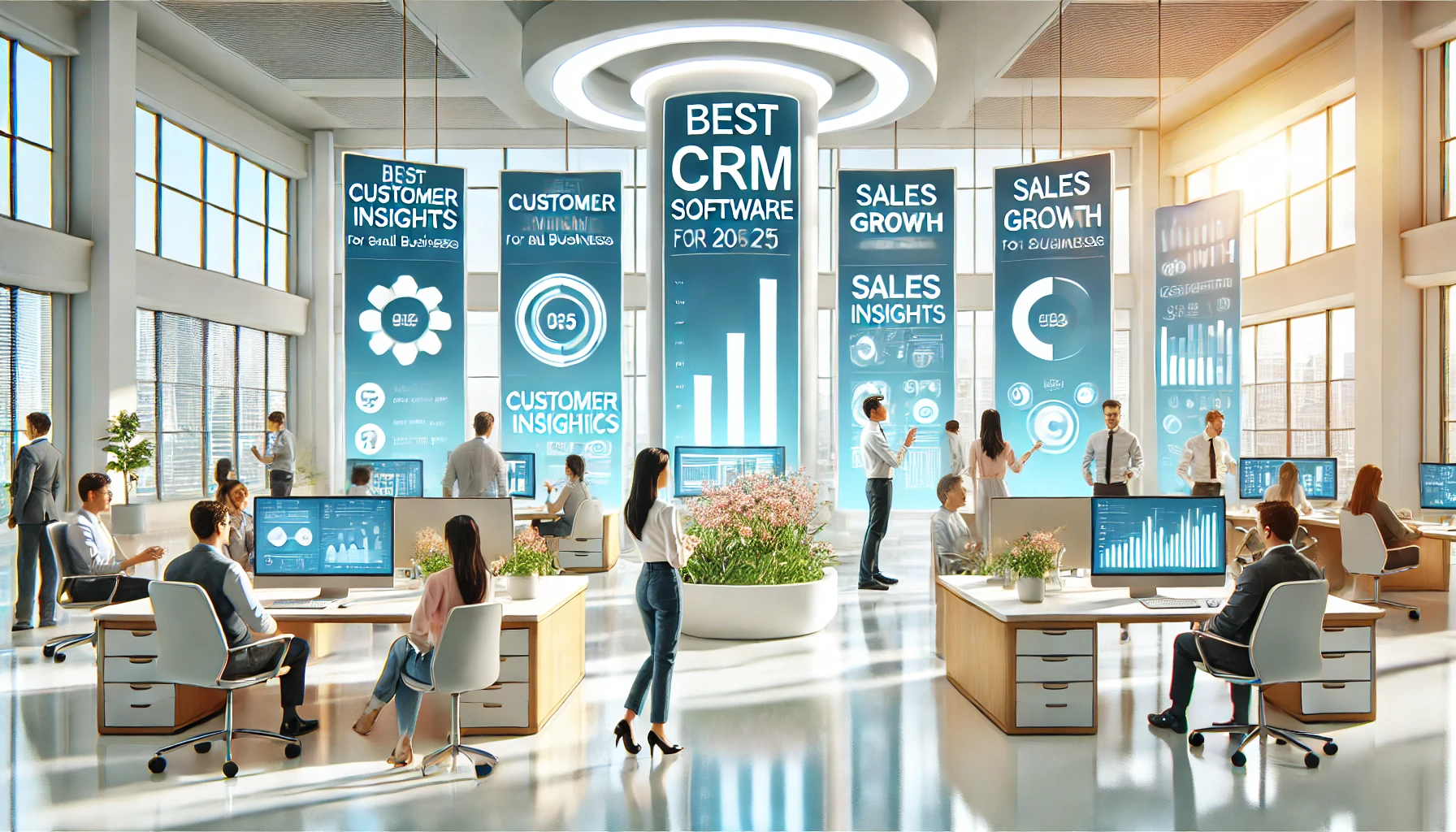
In the fast-paced world of small business, maintaining strong customer relationships is crucial for success. Customer Relationship Management (CRM) software has become an essential tool for small businesses, helping them manage interactions with customers, streamline processes, and improve profitability. As we look ahead to 2025, the landscape of CRM software is evolving rapidly, with new features and technologies emerging to meet the needs of small businesses. In this article, we will explore the best CRM software options for small businesses in 2025, highlighting their key features, benefits, and how they can help you grow your business.
What is CRM Software?
CRM software is a technology that helps businesses manage their relationships and interactions with potential and existing customers. It enables businesses to streamline processes, improve customer service, and increase sales. By centralizing customer information, CRM software allows small businesses to track customer interactions, manage leads, and analyze data to make informed decisions.
Why Small Businesses Need CRM Software
1. Improved Customer Relationships: CRM software helps small businesses understand their customers better, leading to improved relationships and increased customer loyalty.
2. Increased Efficiency: By automating repetitive tasks and centralizing information, CRM software allows small businesses to operate more efficiently.
3. Data-Driven Decisions: CRM software provides valuable insights into customer behavior and preferences, enabling small businesses to make data-driven decisions.
4. Scalability: As small businesses grow, CRM software can scale with them, accommodating an increasing number of customers and data.
Key Features to Look for in CRM Software
When choosing a CRM software for your small business, consider the following key features:
– User-Friendly Interface: A simple and intuitive interface is essential for ensuring that your team can easily adopt and use the software.
– Customization Options: Look for CRM software that allows you to customize fields, dashboards, and reports to fit your specific business needs.
– Integration Capabilities: The ability to integrate with other tools and software you already use (such as email marketing platforms, accounting software, etc.) is crucial for seamless operations.
– Mobile Access: In today’s mobile world, having access to your CRM on the go is essential for staying connected with customers and managing tasks.
– Analytics and Reporting: Robust analytics and reporting features will help you track performance and make informed decisions based on data.
Top CRM Software for Small Businesses in 2025
1. HubSpot CRM
Overview: HubSpot CRM is a popular choice for small businesses due to its user-friendly interface and robust features. It offers a free version with essential CRM functionalities, making it accessible for startups and small businesses.
Key Features:
– Contact management
– Email tracking and notifications
– Sales pipeline management
– Integration with HubSpot’s marketing tools
Benefits: HubSpot CRM is ideal for small businesses looking for a comprehensive solution that can grow with them. Its free version allows businesses to get started without any financial commitment.
2. Zoho CRM
Overview: Zoho CRM is a versatile CRM solution that offers a wide range of features tailored for small businesses. It provides a customizable platform that can adapt to various industries.
Key Features:
– Lead and contact management
– Workflow automation
– AI-powered sales assistant
– Multi-channel communication
Benefits: Zoho CRM is known for its affordability and extensive customization options, making it a great choice for small businesses with unique needs.
3. Salesforce Essentials
Overview: Salesforce Essentials is designed specifically for small businesses, offering a simplified version of the powerful Salesforce platform. It provides essential CRM features without overwhelming users.
Key Features:
– Lead and opportunity management
– Customizable dashboards
– Email integration
– Mobile app access
Benefits: Salesforce Essentials is perfect for small businesses looking to leverage the power of Salesforce without the complexity of its larger offerings.
4. Pipedrive
Overview: Pipedrive is a sales-focused CRM that helps small businesses manage their sales processes effectively. Its visual sales pipeline makes it easy to track deals and customer interactions.
Key Features:
– Visual sales pipeline
– Activity reminders
– Email integration
– Reporting and analytics
Benefits: Pipedrive is ideal for small businesses that prioritize sales and need a straightforward tool to manage their sales processes.
5. Freshsales
Overview: Freshsales, part of the Freshworks suite, is a CRM solution designed for small businesses that want to enhance their sales processes. It combines a user-friendly interface with powerful features to help businesses manage leads and customer relationships effectively.
Key Features:
– Lead scoring and tracking
– Built-in phone and email capabilities
– AI-based insights and recommendations
– Customizable sales pipelines
Benefits: Freshsales is particularly beneficial for small businesses looking for an all-in-one solution that integrates sales, marketing, and customer support functionalities. Its AI features help businesses prioritize leads and improve conversion rates.
6. Agile CRM
Overview: Agile CRM is a cost-effective solution that offers a range of features tailored for small businesses. It focuses on providing essential CRM functionalities without overwhelming users with unnecessary complexity.
Key Features:
– Contact management
– Email tracking and marketing automation
– Social media integration
– Task management and reminders
Benefits: Agile CRM is perfect for small businesses on a budget, offering a free tier with essential features and affordable paid plans. Its simplicity makes it easy for teams to adopt and use effectively.
7. Insightly
Overview: Insightly is a CRM and project management tool designed for small businesses that need to manage customer relationships alongside project workflows. It offers a unique blend of CRM and project management features.
Key Features:
– Contact and project management
– Workflow automation
– Email integration
– Custom reporting
Benefits: Insightly is ideal for small businesses that require both CRM and project management capabilities in one platform. Its ability to manage projects and customer relationships simultaneously can enhance productivity.
8. Keap (formerly Infusionsoft)
Overview: Keap is a CRM solution that focuses on small businesses looking to automate their sales and marketing processes. It combines CRM functionalities with marketing automation tools to help businesses nurture leads effectively.
Key Features:
– Marketing automation
– E-commerce capabilities
– Lead capture forms
– Appointment scheduling
Benefits: Keap is particularly beneficial for small businesses that want to streamline their marketing efforts while managing customer relationships. Its automation features can save time and improve lead conversion rates.
Choosing the Right CRM for Your Small Business
When selecting the best CRM software for your small business in 2025, consider the following factors:
- Business Needs: Assess your specific business needs and choose a CRM that aligns with your goals. Consider factors such as the size of your team, the complexity of your sales processes, and your budget.
- Ease of Use: A user-friendly interface is crucial for ensuring that your team can quickly adopt the software. Look for CRM solutions that offer intuitive navigation and easy onboarding.
- Scalability: As your business grows, your CRM should be able to scale with you. Choose a solution that can accommodate an increasing number of users and features as your needs evolve.
- Customer Support: Reliable customer support is essential for resolving any issues that may arise. Look for CRM providers that offer responsive support channels, such as live chat, email, or phone support.
- Trial Period: Many CRM providers offer free trials or demos. Take advantage of these opportunities to test the software and determine if it meets your business needs before making a commitment.
Conclusion
In 2025, the best CRM software for small businesses will continue to evolve, offering innovative features and capabilities to help businesses thrive. Whether you choose HubSpot CRM for its user-friendly interface, Zoho CRM for its customization options, or Salesforce Essentials for its powerful features, the right CRM can significantly enhance your customer relationships and drive business growth.
Investing in a CRM solution is not just about managing customer data; it’s about building lasting relationships that can lead to increased sales and customer loyalty. By carefully evaluating your options and selecting the right CRM for your small business, you can set yourself up for success in the competitive landscape of 2025.

